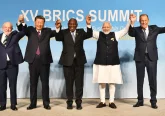 On Wednesday, 29 February, 2012, the Oxford European Studies Centre hosted two esteemed guests: Daniel Cohn-Bendit, co-president of the European Greens in the European Parliament and renowned activist of the French left; and Edouard Gaudot, researcher for the European Greens and member of the Spinelli Group. The event offered a lively discussion regarding the ramifications of the European crisis, particularly in light of recent events regarding the Greek debt.
On Wednesday, 29 February, 2012, the Oxford European Studies Centre hosted two esteemed guests: Daniel Cohn-Bendit, co-president of the European Greens in the European Parliament and renowned activist of the French left; and Edouard Gaudot, researcher for the European Greens and member of the Spinelli Group. The event offered a lively discussion regarding the ramifications of the European crisis, particularly in light of recent events regarding the Greek debt.
Mr. Cohn-Bendit began the debate by characterizing the current climate as “a turning point in European history, because the European Union is confronted with one of its most serious crises, caused by the financial crisis”. In reference to its efforts to grapple with economic catastrophe, he contended that the EU is “learning by doing”, with most European governments pursuing “inappropriate methods” for damage control. An outspoken proponent of European federalisation, Cohn-Bendit described France and Germany as “trying to lead the EU”, but warned that if they “push in the wrong direction their leadership will be a problem— [and] that’s what we have at the moment”. He spoke critically about the handling of the Greek crisis, conjuring the metaphor: “if the medicine kills the patient, they can never recover”. Ultimately, Cohn-Bendit said he envisions a shared mutual fund for European debt in the hopes that such a policy would encourage greater political integration within the EU.
Articulating similar concerns, Mr. Gaudot followed Cohn-Bendit by responding to the question,”What kind of Europe is in the making?”. “We are facing a tipping point by all means”, he acknowledged, adding, “the key for the new Europe is tied to one word: Democracy”. For Gaudot, the despair of the economic crisis brings new hope of “transnational democracy”— the opening of democratic spaces beyond the nation-state. Speaking with a sense of optimism, he conjectured, “Either Europe can move forward and build this transnational democracy, or [it] can go back to what we have now, with the EU simply acting as a market space”. Contrary to the latter, Gaudot sees the EU as a “laboratory for the democracy of tomorrow”, as evidenced by the Occupy movement, and other grassroots campaigns across Europe.
The commentary provided by both men suggests how the devastation caused by the Eurozone crisis has the potential to sow the seeds of a more vibrant, cooperative and democratic Europe. As the continent copes with economic malady, activists such as Cohn-Bendit and Gaudot are prescribing a stronger EU— one that is a radical departure from the nation-state psychology of “compete and conquer”. “We have to defend the EU”, Cohn-Bendit said with conviction, “because it is the first time Europe has produced a political paradigm that is not inherently aggressive. We have been the continent of fascism, Stalinism, and imperialism; this is something entirely different”.
Cailin Crockett is a second-year MPhil in Political Theory at Oxford University and a Graduate Ambassador for Politics in Spires; her research engages with gender, democratic theory and global justice.





No Comment